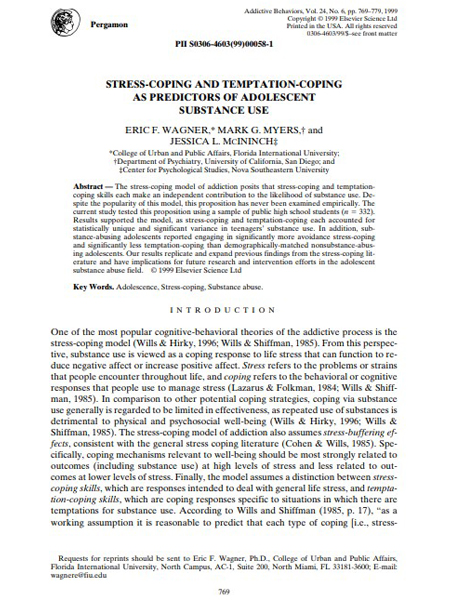Stress-coping and temptation-coping as predictors of adolescent substance use
 Abstract: The stress-coping model of addiction posits that stress-coping and temptation-coping skills each make an independent contribution to the likelihood of substance use. Despite the popularity of this model, this proposition has never been examined empirically. The current study tested this proposition using a sample of public high school students (n = 332). Results supported the model, as stress-coping and temptation-coping each accounted for statistically unique and significant variance in teenagers’ substance use. In addition, substance-abusing adolescents reported engaging in significantly more avoidance stress-coping and significantly less temptation-coping than demographically-matched nonsubstance-abusing adolescents. Our results replicate and expand previous findings from the stress-coping literature and have implications for future research and intervention efforts in the adolescent substance abuse field.
Abstract: The stress-coping model of addiction posits that stress-coping and temptation-coping skills each make an independent contribution to the likelihood of substance use. Despite the popularity of this model, this proposition has never been examined empirically. The current study tested this proposition using a sample of public high school students (n = 332). Results supported the model, as stress-coping and temptation-coping each accounted for statistically unique and significant variance in teenagers’ substance use. In addition, substance-abusing adolescents reported engaging in significantly more avoidance stress-coping and significantly less temptation-coping than demographically-matched nonsubstance-abusing adolescents. Our results replicate and expand previous findings from the stress-coping literature and have implications for future research and intervention efforts in the adolescent substance abuse field.
Wagner, E.F., Myers, M.G., & Mcininch, J.L. (1999). Stress-coping and temptation-coping as predictors of adolescent substance use. Addictive Behaviors, 24(6), 769-779. doi:10.1016/s0306-4603(99)00058-1
